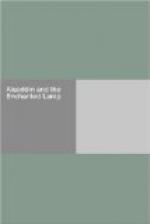[FN#86] So as to form a magic barrier against the Jinn, after the fashion of the mystical circles used by European necromancers.
[FN#87] Night DIV.
[FN#88] Fe-halan tuata, the time-honoured “Ask and it shall be given unto thee.”
[FN#89] Sic (berec ed dunya); but dunya (the world) is perhaps meant to be taken here by synecdoche m the sense of “sky.”
[FN#90] Syn. “darkness was let down like a curtain.”
[FN#91] Lit. “like an earthquake like the earthquakes”; but the second “like " (mithl) is certainly a mistranscription for “of” (min).
[FN#92] Night DV.
[FN#93] Night DVI.
[FN#94] Here we have the word mithl (as or like) which I supplied upon conjecture in the former description of the genie; see ante, p. 24, note.
[FN#95] Medinetu ’l meda
[FN#96] Lit. “How [is] the contrivance and the way the which we shall attain by (or with) it to. . . .”
[FN#97] I.a tehtenim; but the text may also be read la tehettem and this latter reading is adopted by Burton, who translates, “Be not beaten and broken down.”
[FN#98] Or “in brief” (bi-tejewwuz). Burton translates, “who maketh marriages,” apparently reading bi-tejewwuz as a mistranscription for tetejewwez, a vulgar Syrian corruption of tetezewwej.
[FN#99] Said in a quasi-complimentary sense, as we say, “Confound him, what a clever rascal he is!” See the Nights passim for numerous instances of this.
[FN#100] Quoth Shehrzad to Shehriyar.
[FN#101] Syn. “to work upon her traces or course” (tesaa ala menakibiha).
[FN#102] Night DVII.
[FN#103] Lit. “the thirsty one (es szadi) and the goer-forth by day or in the morning,, (el ghadi); but this is most probably a mistranscription for the common phrase es sari (the goer by night) wa ’l ghadi, often used in the sense of “comers and goers” simply. This would be quite in character with the style of our present manuscript, which constantly substitutes sz (sad) for s (sin), e.g. szerai for serai (palace), szufreh, for sufreh (meal-tray), for hheresza for hheresa(he guarded), etc., etc., whilst no one acquainted with the Arabic written character need be reminded how easy it is to mistake a carelessly written-r (ra) for d (dal) or vice-versa
[FN#104] The mosque being the caravanserai of the penniless stranger.
[FN#105] The person specially appointed to lead the prayers of the congregation and paid out of the endowed revenues of the mosque to which he is attached.
[FN#106] Night DVIII.
[FN#107] Burton translates, “these accurseds,”
reading melaa




